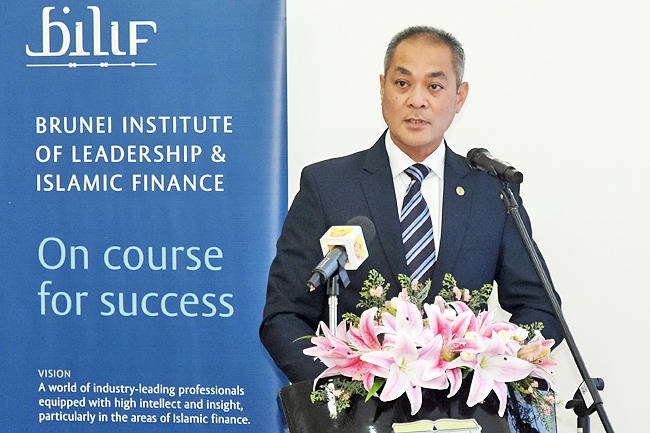Embracing change and being willing to pivot when necessary is essential to stay on course towards Brunei Vision 2035, Minister of Home Affairs Dato Seri Setia Awang Haji Ahmaddin bin Haji Abdul Rahman said yesterday.
He made these comments as the guest of honour in his keynote speech at the Brunei Institute of Leadership and Islamic Finance (BILIF)-Institute for Leadership, Innovation and Advancement (ILIA) Leadership Forum 2023.
The minister also paid tribute to the wisdom and visionary leadership of His Majesty Sultan Haji Hassanal Bolkiah Mu’izzaddin Waddaulah ibni Al-Marhum Sultan Haji Omar ‘Ali Saifuddien Sa’adul Khairi Waddien, Sultan and Yang Di-Pertuan of Brunei Darussalam who has been an exemplar of stability, progress, and the pursuit of excellence Dato Seri Setia Awang Haji Ahmaddin said, “In a world where leadership is constantly evolving and facing new challenges, it is vital for nations and organisations to continuously strive for the next level of leadership.
Next-level leadership is about embracing innovation, adaptability, and forward-thinking strategies to address the complex issues of our time.”
He continued, “As we discuss the next-level leadership, let us draw inspiration from the visionary leadership of His Majesty on the progress that Brunei Darussalam has achieved under His Majesty’s guidance. Let us also recognise the importance of nurturing the next generation of leaders who will carry forward the torch of progress and development.”
The pursuit of the ambitious targets set out in Brunei Vision 2035, he highlighted, “requires a forward-thinking and adaptable approach to leadership. In the face of uncertainties and challenges, it is imperative that leaders must be willing to embrace different leadership styles and adjust their mindsets to achieve collective goals effectively”.

“The ability to adapt to changing circumstances and be flexible in our approach is a hallmark of an effective leadership. In a rapidly evolving world, leaders must be open to new ideas, technologies, and ways of doing things.” Effective leadership often involves collaboration and cooperation, he added. “Leaders should be willing to work together, not only within their own organisations or sectors but also on a national and international level. Collaboration can lead to innovative solutions and shared resources that benefit everyone.”
As leaders, the minister said, “We must recognise that compromise can be a powerful tool in achieving common goals. It may require finding common ground and making concessions for the greater good. Compromise doesn’t mean sacrificing principles but rather finding ways to balance competing interests. Ensuring that all segments of society are represented and heard is crucial in effective leadership. An inclusive approach fosters diversity of thought and perspectives, which can lead to more comprehensive and well-rounded solutions.”
The minister also highlighted that leaders must be committed to lifelong learning, which includes keeping up with the latest developments in their fields, as well as seeking out opportunities for personal and professional growth.
He said, “A willingness to learn and adapt is key to staying relevant and effective. While adapting and compromising are important, visionary thinking remains at the core of leadership. Leaders should have a clear vision of the future they want to create and inspire others to join them on that journey. Brunei Vision 2035 is a testament to the power of visionary leadership. Next-level leadership is not limited to a specific title or position; it is a mindset and a set of qualities that can be cultivated and practiced at all levels of an organisation.
“It is a commitment to continuous improvement, personal growth, and the greater good of the organisation, community, or nation. By embodying these qualities, next-level leaders create a positive and impactful legacy,” he said. – James Kon





